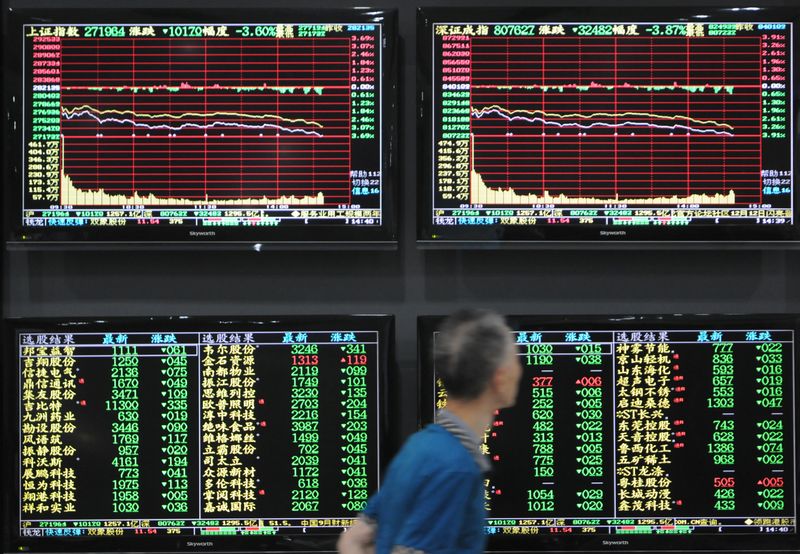
© Reuters. A man walks past screens showing stock information at a brokerage house in Jiujiang, Jiangxi province, China October 8, 2018. REUTERS/Stringer
By Patturaja Murugaboopathy and Gaurav Dogra
(Reuters) – Emerging market equity funds are outpacing developed market rivals in attracting inflows for the first time in three years, underscoring a relatively more favourable growth outlook and expectations of faster rate cuts in many less developed markets.
Refinitiv Lipper data shows money inflows into emerging market (EM) equity funds hit $30.55 billion in the first half of the year, compared with outflows of $88.65 billion from developed market equity funds.
Data from the Institute of International Finance on Thursday also showed foreigners injected a staggering $22 billion net into emerging market portfolios in June, marking the highest influx since January.
The case for emerging markets, analysts say, is they were ahead of developed markets in tightening monetary policy and are now beginning to reap the rewards of falling inflation, lower borrowing costs and improved growth.
For instance, Brazil’s inflation is at its lowest level in almost three years, thanks to an aggressive 1,175 basis points of rate hikes. Economists expect Brazil’s central bank to soon cut rates, while the government expects better growth.
In May, Hungary’s central bank lowered interest rates, kicking off the policy-easing cycle in Europe.
On the other hand, both the U.S. Fed and European Central Bank have flagged the possibility of further rate hikes to combat inflation.
Refinitiv data shows income at companies in emerging markets is expected to grow 6.8% this year, compared with a decline of 3.4% in U.S. companies’ incomes and developed Europe’s meagre growth of 0.02%.
has seen a relatively modest increase of 6.7 % this year compared to the ‘s 16% gain. This underperformance of EM equities has meant better valuations, with the MSCI EM index trading at a 12-month price-to-earnings ratio of 12.08, a substantial discount to MSCI World’s P/E of 17.03.
“With valuation spreads versus developed markets at decade highs and global allocators still significantly underweight the space, EM benefits from a healthy margin of safety,” said Malcolm Dorson, senior portfolio manager at Global X, who said he was adding to emerging market exposure.
However, analysts have expressed concerns about China’s economic slowdown potentially affecting EM equities.
Chinese Premier Li Qiang, who took up his post in March, has promised to roll out policy measures to boost demand and invigorate markets, but few concrete steps have been announced and investors are growing impatient.
“The big question in EM is China. The overall fundamentals for China look poor. Demographics are some of the worst in the world. An over-leveraged real estate sector impedes growth,” said Derek Izuel, chief investment officer and portfolio manager of the Shelton Emerging Markets Fund.
“While the outlook for the overall trend is weak, there can be sporadic rallies along the way,” he said.





